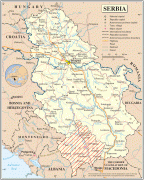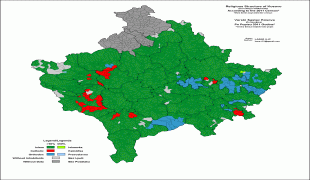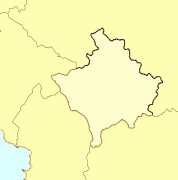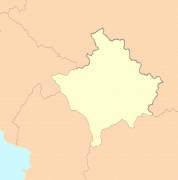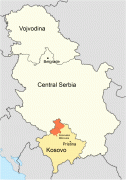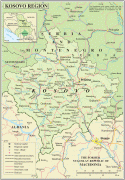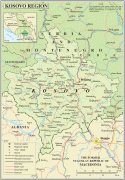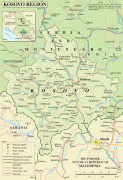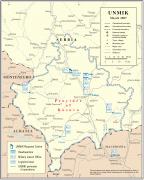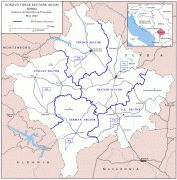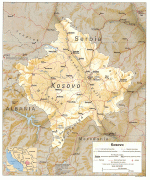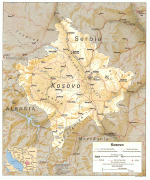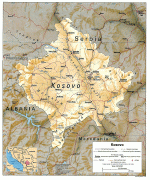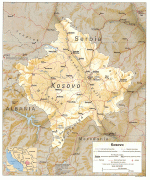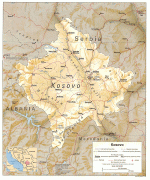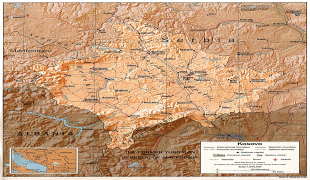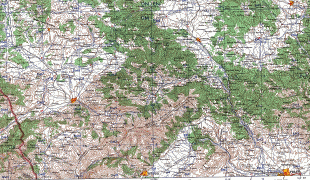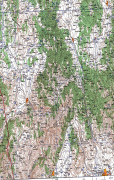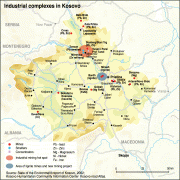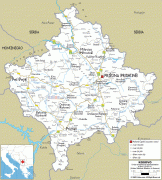Kosovo (Republic of Kosovo)
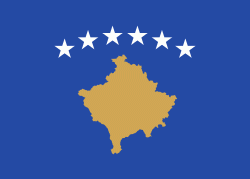 |
 |
In classical antiquity, the central tribe which emerged in the territory of Kosovo were the Dardani, who formed an independent polity known as the Kingdom of Dardania in the 4th century BC. It was annexed by the Roman Empire by the 1st century BC, and for the next millennium, the territory remained part of the Byzantine Empire, whose rule was eroded by Slavic invasions beginning in the 6th–7th century AD. In the centuries thereafter, control of the area alternated between the Byzantines and the First Bulgarian Empire. By the 13th century, Kosovo became the core of the Serbian medieval state, and has also been the seat of the Serbian Orthodox Church from the 14th century, when its status was upgraded to a patriarchate. Ottoman expansion in the Balkans in the late 14th and 15th century led to the decline and fall of the Serbian Empire; the Battle of Kosovo of 1389 is considered to be one of the defining moments in Serbian medieval history. The Ottomans fully conquered the region after the Second Battle of Kosovo. The Ottoman Empire ruled the area for almost five centuries until 1912.
In the late 19th century, Kosovo was the center of the Albanian National Movement and where the Albanian revolt of 1910 and Albanian revolt of 1912 took place. Following their defeat in the Balkan Wars, the Ottomans ceded Kosovo to Serbia and Montenegro. Both countries joined Yugoslavia after World War I, and following a period of Yugoslav unitarism in the Kingdom, the post-World War II Yugoslav constitution established the Autonomous Province of Kosovo and Metohija within the Yugoslav constituent republic of Serbia. Tensions between Kosovo's Albanian and Serb communities simmered through the 20th century and occasionally erupted into major violence, culminating in the Kosovo War of 1998 and 1999, which resulted in the withdrawal of the Yugoslav army, and the establishment of the United Nations Interim Administration Mission in Kosovo. Ultimately, Kosovo unilaterally declared its independence from Serbia on 17 February 2008, and has since gained diplomatic recognition as a sovereign state by member states of the United Nations. Serbia does not officially recognise Kosovo as a sovereign state and continues to claim it as its constituent Autonomous Province of Kosovo and Metohija, although it accepts the governing authority of the Kosovo institutions as a part of the 2013 Brussels Agreement.
Kosovo is a developing country, with an upper-middle-income economy. It has experienced solid economic growth over the last decade as measured by international financial institutions since the onset of the financial crisis of 2007–2008. Kosovo is a member of the International Monetary Fund, World Bank, and has applied for membership in the Council of Europe, UNESCO, Interpol, and for observer status in the Organisation of Islamic Cooperation. In December 2022, Kosovo filed a formal application to become a member of the European Union.
The entire region that today corresponds to the territory is commonly referred to in English simply as Kosovo and in Albanian as Kosova (definite form, ) or Kosovë ("indefinite" form, ). In Serbia, a formal distinction is made between the eastern and western areas; the term Kosovo (Косово) is used for the eastern part centred on the historical Kosovo Field, while the western part is called Metohija (known as Dukagjini in Albanian).
Kosovo (Косово, ) is the Serbian neuter possessive adjective of kos (кос) "blackbird", an ellipsis for Kosovo Polje, 'blackbird field', the name of a plain situated in the eastern half of today's Kosovo and the site of the 1389 Battle of Kosovo Field. The name of the plain was applied to the Kosovo Province created in 1864.
Albanians also refer to Kosovo as Dardania, the name of an ancient kingdom and later Roman province, which covered the territory of modern-day Kosovo. The name is derived from the ancient tribe of the Dardani, possibly related to the Proto-Albanian term dardā, which means "pear" (Modern Albanian: dardhë). The former Kosovo President Ibrahim Rugova had been an enthusiastic backer of a "Dardanian" identity, and the Kosovar presidential flag and seal refer to this national identity. However, the name "Kosova" remains more widely used among the Albanian population. In recent years, the flag of Dardania gas gained official status (Presidential seal and standard) and is heavily featured in the institution of the presidency.
The current borders of Kosovo were drawn while part of Yugoslavia in 1945, when the Autonomous Region of Kosovo and Metohija (1945–1963) was created as an administrative division of the new People's Republic of Serbia. In 1963, it was raised from the level of an autonomous region to the level of an autonomous province as the Autonomous Province of Kosovo and Metohija (1963–1968). In 1968, the dual name "Kosovo and Metohija" was reduced to a simple "Kosovo" in the name of the Socialist Autonomous Province of Kosovo. In 1990, the province was renamed the Autonomous Province of Kosovo and Metohija.
The official conventional long name of the state is Republic of Kosovo, as defined by the Constitution of Kosovo, and is used to represent Kosovo internationally. Additionally, as a result of an arrangement agreed between Pristina and Belgrade in talks mediated by the European Union, Kosovo has participated in some international forums and organisations under the title "Kosovo*" with a footnote stating, "This designation is without prejudice to positions on status, and is in line with UNSC 1244 and the ICJ Opinion on the Kosovo declaration of independence". This arrangement, which has been dubbed the "asterisk agreement", was agreed in an 11-point arrangement on 24 February 2012.






